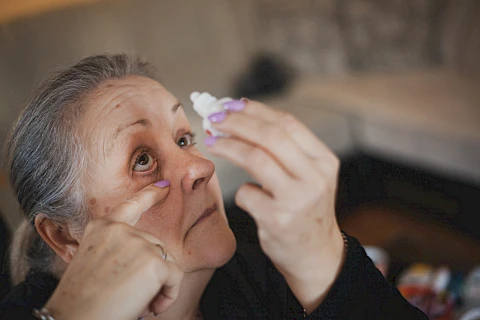
Dry eye syndrome is a condition that affects many older adults. It causes discomfort and, if left untreated, can lead to more serious eye issues. Recognizing symptoms and seeking prompt treatment can make a difference in managing dry eye syndrome in seniors.
Older Adults and Dry Eye Syndrome
Dry eye syndrome occurs when your eyes don't produce enough tears or the tears evaporate too quickly. This results in the eyes not staying adequately lubricated. The condition becomes more common with age as tear production naturally declines. Certain medications can contribute to reduced tear production. Medical conditions like diabetes and rheumatoid arthritis can also exacerbate dry eye syndrome due to their effects on tear production.
Identifying Symptoms
Recognizing the symptoms of dry eye syndrome early can help prevent complications and make managing the condition easier. Typical signs include:
- Constant itchiness or a gritty feeling in the eyes
- Burning sensations
- Redness and soreness
- Excessive tearing as the eyes try to compensate for dryness
If you frequently experience these symptoms, discuss them with a healthcare provider.
Coping With Dry Eye Syndrome
Upon diagnosis, managing dry eye syndrome becomes a priority. Several practical steps can help alleviate symptoms and improve comfort. Artificial tears can be a simple and effective treatment. They come in various types, including preservative-free options that are gentler on the eyes. Use them per your doctor's recommendations to keep your eyes lubricated.
Maintaining a humidified environment can also be beneficial. A humidifier can help add moisture to the air, especially during dry seasons or in air-conditioned environments. Keeping the humidity level comfortable helps prevent your eyes from drying out.
Making a few lifestyle changes can also alleviate symptoms. Stay hydrated by drinking plenty of water. Include omega-3 fatty acids in your diet. Foods like fish, flaxseeds, and walnuts are good sources. Avoid smoking and reduce exposure to smoke and other irritants. Limiting screen time and taking regular breaks to rest your eyes can also help.
Regularly cleaning your eyelids with a gentle cleanser can reduce irritation. A warm compress can also help unblock oil glands and improve tear quality. Consider wearing wraparound sunglasses or protective glasses to shield your eyes from wind, dust, and other irritants.
When to Seek Professional Help
Sometimes, self-care measures aren't enough, and professional intervention is needed. Seek medical attention if symptoms persist or worsen despite using artificial tears. Notify your eye doctor if you experience severe eye pain or discharges or if your vision becomes blurry. Eye care specialists may recommend prescription eye drops, special contact lenses, or procedures to block tear ducts and conserve natural tears as treatment options.
Manage Dry Eye Syndrome With Support From Senior Helpers
Keeping up with the day-to-day tasks at home can be challenging when dealing with dry eye syndrome. If you could use additional support at home, including assistance with light housekeeping, errands, and other aspects of senior care, Senior Helpers Northern Delaware can help. Serving Newark, Wilmington, Bear, and New Castle County, we provide quality in-home care tailored to the needs of the seniors in the community. Contact us today for more information about our range of home care services!